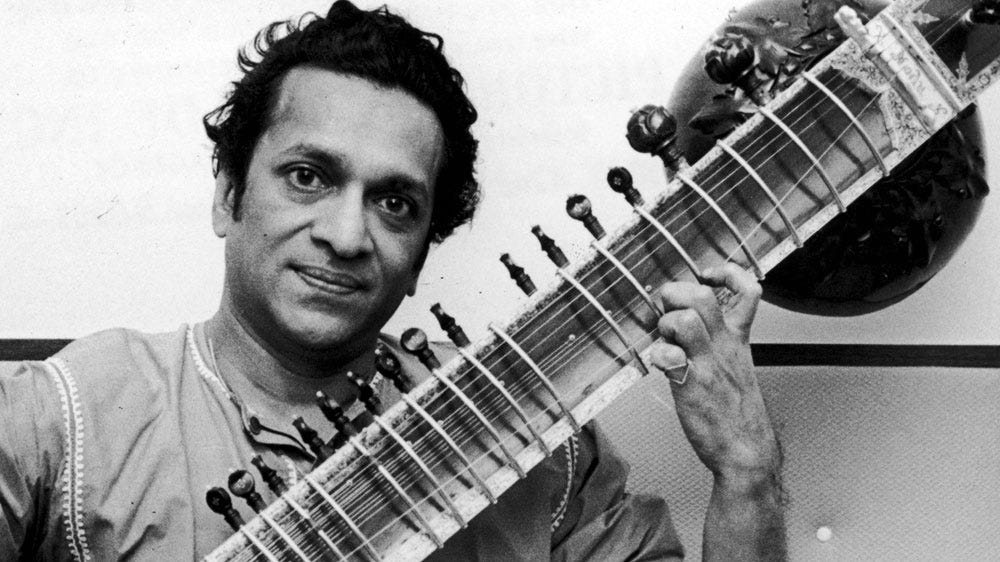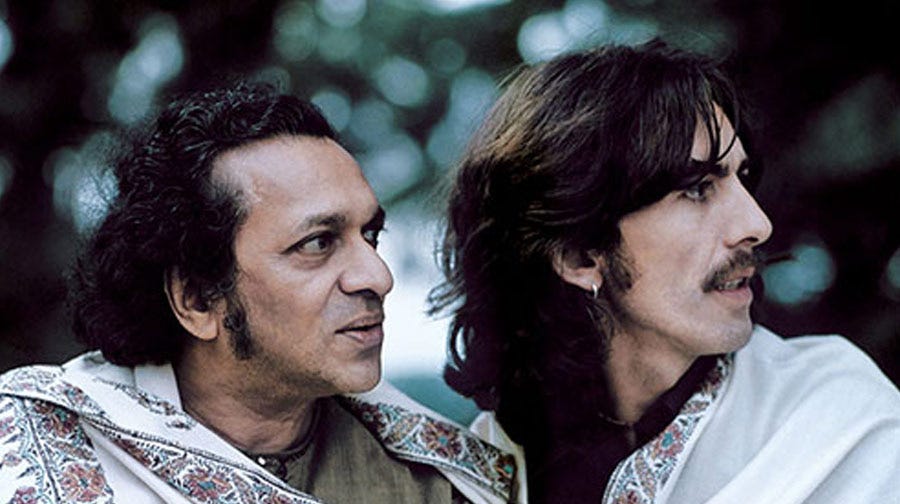Ravi Shankar
Ravi Shankar, an Indian sitar virtuoso and composer, played a pivotal role in bridging the cultural and musical gap between the East and West during the 1960s and 1970s.
His influence extended deeply into the heart of the hippy culture, introducing many in the Western world to Indian classical music and, by extension, Eastern spirituality and philosophy. Shankar's association with prominent figures of the era, his performances at iconic festivals, and his influence on popular music contributed significantly to his status as a cultural icon of the time.
Early Career
Born on April 7, 1920, in Varanasi, India, Ravi Shankar began his career as a dancer in his brother Uday Shankar's dance troupe but later turned to the sitar, studying under the tutelage of Allauddin Khan. By the 1950s, Shankar was already a recognized master of the instrument in India, performing extensively and working as a composer. His tours in the Soviet Union, Europe, and the United States in the 1950s introduced Western audiences to Indian classical music, laying the groundwork for his future influence on the hippy movement.
Meeting with George Harrison
A pivotal moment in Shankar's career came in the mid-1960s when he met George Harrison, the lead guitarist of The Beatles. Harrison was fascinated by the sitar and sought Shankar's tutelage to learn the instrument. This relationship led to the sitar being featured in Beatles' songs like "Norwegian Wood (This Bird Has Flown)" and "Within You Without You," sparking a widespread interest in Indian music and culture among young Westerners. Shankar's guidance of Harrison not only elevated his own status in the West but also made him a spiritual and musical mentor to many in the hippy culture.
Woodstock and the Monterey Pop Festival
Ravi Shankar's performances at the Monterey Pop Festival in 1967 and the Woodstock Festival in 1969 further cemented his connection to the hippy movement. Although Shankar later expressed ambivalence about the drug use and countercultural aspects of these festivals, his participation showcased the sitar to massive audiences and symbolized the fusion of Eastern and Western musical traditions. His appearance at these events was emblematic of the era's experimentation with new forms of music and the search for spiritual depth.
Influence on Popular Music and Culture
Shankar's impact on Western music extended beyond his direct collaborations. Many artists and bands of the time, influenced by Shankar's music and the broader wave of interest in Indian culture, began incorporating elements of Indian music into their work, contributing to the psychedelic sound that defined much of the music of the late 1960s. The sitar, in particular, became a popular instrument in psychedelic rock, and Indian-inspired fashion and spirituality became hallmarks of hippy culture.
Legacy
Ravi Shankar's relationship with the hippy movement was complex. While he appreciated the openness of Western audiences to his music and the opportunities to bridge cultural divides, he was critical of the drug use associated with the movement and was concerned about the superficial understanding of Indian spirituality. Despite these reservations, Shankar's contribution to the global appreciation of Indian music and his role in the cultural exchange between East and West during the 1960s and 1970s are undisputed.
Ravi Shankar passed away on December 11, 2012, leaving behind a legacy that transcends his musical achievements. As a cultural ambassador who introduced the depth and richness of Indian classical music to the world, Shankar played a significant role in the soundtrack of the hippy era, influencing not just the music of the time but also its spiritual and philosophical underpinnings. His life and work remain a testament to the power of music as a bridge between diverse cultures and a source of universal connection.

